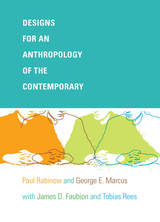
Both Rabinow and Marcus participated in the milestone collection Writing Culture: The Poetics and Politics of Ethnography. Published in 1986, Writing Culture catalyzed a reassessment of how ethnographers encountered, studied, and wrote about their subjects. In the opening conversations of Designs for an Anthropology of the Contemporary, Rabinow and Marcus take stock of anthropology’s recent past by discussing the intellectual scene in which Writing Culture intervened, the book’s contributions, and its conceptual limitations. Considering how the field has developed since the publication of that volume, they address topics including ethnography’s self-reflexive turn, scholars’ increased focus on questions of identity, the Public Culture project, science and technology studies, and the changing interests and goals of students. Designs for an Anthropology of the Contemporary allows readers to eavesdrop on lively conversations between anthropologists who have helped to shape their field’s recent past and are deeply invested in its future.

This book explores diverse but complementary interdisciplinary approaches to the poetics, intertexts, and influence of the work of C. P. Cavafy (Konstantinos Kavafis), one of the most important twentieth-century European poets. Written by leading international scholars in a number of disciplines (critical theory, gender studies, comparative literature, English studies, Greek studies, anthropology, classics), the essays of this volume situate Cavafy’s poetry within the broader contexts of modernism and aestheticism and investigate its complex and innovative responses to European literary traditions (from Greek antiquity to modernity) as well as its multifaceted impact on major figures of world literature—from North America to South Africa.
Contributors include Eve Sedgwick, Helen Vendler, Dimitrios Yatromanolakis, Richard Dellamora, Mark Doty, James Faubion, Diana Haas, John Chioles, Albert Henrichs, Kathleen Coleman, Michael Paschalis, Peter Jeffreys, and Panagiotis Roilos.
READERS
Browse our collection.
PUBLISHERS
See BiblioVault's publisher services.
STUDENT SERVICES
Files for college accessibility offices.
UChicago Accessibility Resources
home | accessibility | search | about | contact us
BiblioVault ® 2001 - 2024
The University of Chicago Press









